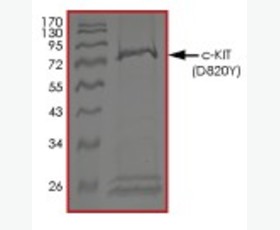Recombinant Human Chloride Intracellular Channel Protein 5/CLIC5
| Product name: | Recombinant Human Chloride Intracellular Channel Protein 5/CLIC5 |
| Source: | E.coli |
| Purity: | Greater than 95% as determined by reducing SDS-PAGE. |
| Buffer Formulation: | Lyophilized from a 0.2 μm filtered solution of 20mM PB, 150mM NaCl, pH 7.4. |
| Applications: | Applications:SDS-PAGE; WB; ELISA; IP. |
| Storage: | Avoid repeated freeze/thaw cycles. Store at 2-8 oC for one month. Aliquot and store at -80 oC for 12 months. |
| UOM: | 100ug/50ug/200ug/1mg/1g |
| Source | E.coli |
| Description | Recombinant Human CLIC5 is produced by our E.coli expression system and the target gene encoding Met1-Ser251 is expressed with a 6His tag at the N-terminus. |
| Names | Chloride Intracellular Channel Protein 5, CLIC5 |
| Accession # | Q9NZA1 |
| Formulation | Lyophilized from a 0.2 μm filtered solution of 20mM PB, 150mM NaCl, pH 7.4. |
| Shipping |
The product is shipped at ambient temperature. |
| Reconstitution |
Always centrifuge tubes before opening. Do not mix by vortex or pipetting. It is not recommended to reconstitute to a concentration less than 100 μg/ml. Dissolve the lyophilized protein in ddH2O. Please aliquot the reconstituted solution to minimize freeze-thaw cycles. |
| Storage |
Lyophilized protein should be stored at < -20°C, though stable at room temperature for 3 weeks. Reconstituted protein solution can be stored at 4-7°C for 2-7 days. Aliquots of reconstituted samples are stable at < -20°C for 3 months. |
| Purity |
Greater than 95% as determined by reducing SDS-PAGE. |
| Endotoxin | Less than 0.1 ng/µg (1 IEU/µg) as determined by LAL test. |
| Amino Acid Sequence |
MGSSHHHHHHSSGLVPRGSHMTDSATANGDDRDPEIELFVKAGIDGESIGNCPFSQRLFMILWLK GVVFNVTTVDLKRKPADLHNLAPGTHPPFLTFNGDVKTDVNKIEEFLEETLTPEKYPKLAAKHRE SNTAGIDIFSKFSAYIKNTKQQNNAALERGLTKALKKLDDYLNTPLPEEIDANTCGEDKGSRRKF LDGDELTLADCNLLPKLHVVKIVAKKYRNYDIPAEMTGLWRYLKNAYARDEFTNTCAADSEIELA YADVAKRLSRS
|
| Background | Chloride Intracellular Channel Protein 5 (CLIC5) is a single-pass membrane protein which belongs to the chloride channel CLIC family. It contains one GST C-terminal domain. Chloride intracellular channels are involved in chloride ion transport within various subcellular compartments. CLIC5 can insert into membranes and form selective ion channels regulated by actin that may transport chloride ions. It may play a role in the regulation of transepithelial ion absorption and secretion. CLIC5 specifically associates with the cytoskeleton of placenta microvilli. CLIC5 is required for the development and/or maintenance of the proper glomerular endothelial cell and podocyte architecture. |














